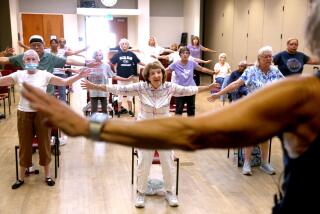Age Issue Falls by the Wayside on Dole Campaign Trail
MANCHESTER, N.H. — Despite sniping by one of his rivals for the Republican presidential nomination, Sen. Bob Dole appears so far to have dodged an issue that only six months ago loomed as a major liability for his campaign: his age.
“He seems vigorous, he looks great,” remarked Jill Adels, a Republican voter here, of the 72-year-old Kansas senator. “His age doesn’t bother me; some people are old at 50, others are young at 70.”
Some recent polls suggest that Adels’ opinion is widespread. A survey of New Hampshire voters published Sunday by the Boston Globe found that 26% thought that a candidate who would be 73 on Inauguration Day is too old to be president. About 60% had the opposite view, and 13% said their answer “depends on the individual.”
“By and large it’s a nonissue for most people,” said Gerry Chervinsky, a public opinion analyst who conducted the poll for the Globe. “People see him being active, being involved. He looks fit and he seems fit.”
But voters’ perceptions can change in the blink of an eye. It might not take much more than a momentary faltering in a televised debate or a bad day on the campaign trail to put the issue of Dole’s age on the front page and the covers of Time and Newsweek, he acknowledged.
“Obviously, if something were to happen to focus attention on the issue,” he said, “everything would change.”
Interviews by The Times here and in Iowa indicate that Dole’s age is less of a factor in voters’ perceptions of him than are other qualities for which he has been razzed by his rivals--including his willingness to negotiate with President Clinton.
Age may even be less an issue in Dole’s campaign than it was for Ronald Reagan, who at 69 began his first term in 1981 as the oldest incoming president in history.
“Some of our greatest leaders in the past were well over 60 or 70 when they functioned most effectively,” said George Krengel, 72, a semiretired Lutheran minister from Perry, Iowa, who is leaning toward supporting commentator Patrick J. Buchanan.
Voters’ coolness to the age issue may explain why it has been exploited thus far by only one of Dole’s seven leading challengers: former Tennessee Gov. Lamar Alexander, 55, who said Dole is out of step with the Republican revolution.
“It may be your turn, but it is not your revolution,” Alexander said to Dole during Saturday’s Republican debate in Iowa. “It’s time we moved on.”
Other challengers are sedulously avoiding the topic. Texas Sen. Phil Gramm, 53, asked during an appearance here Monday if he thought Dole’s age should be an issue in the campaign, snapped: “I think the age of Bob Dole’s ideas is an issue. I don’t think Bob Dole’s age should be an issue.”
That bespeaks a far different atmosphere than what prevailed as recently as this summer. At the time, political commentary focused on Dole’s age and provoked his campaign staff to release his medical records. They even allowed him to be photographed working out on an indoor treadmill in striped shorts.
Doctors pronounced the candidate in excellent health and documented his recovery from near-fatal World War II wounds he received in 1944. Those wounds left him with only one kidney, a permanently paralyzed right arm, and numbness in the fingers of his left hand.
The medical records also detailed Dole’s recovery from surgery on a cancerous prostate gland in 1991.
Political analysts say Dole may be a beneficiary of Americans’ shifting perceptions of the importance of age and health in their presidents. A vigorous-looking John F. Kennedy was inaugurated in 1961 at the age of 43.
But historians now believe that JFK’s multiple infirmities, which included a progressive disease of the adrenal glands and back problems, may have seriously hampered his performance in such important settings as his Vienna summit with Soviet Premier Nikita S. Khrushchev.
“Kennedy, who looked like a god in his early 40s, was a very sick man,” says political columnist Richard Reeves, the author of the book “President Kennedy.”
At the other end of the scale is Ronald Reagan, who was so fit in his first term that he was scarcely slowed by the bullet of a would-be assassin.
Still, the presidency is a highly stressful position that takes its toll on officeholders of all ages. “About two-thirds of American presidents have died prematurely, and stress is very much related to that,” said Robert E. Gilbert, a political science professor at Northeastern University and author of the 1992 book “The Mortal Presidency: Illness and Anguish in the White House.” (As it happens, Gilbert observed that Reagan, although the oldest president yet, successfully handled the stress by remaining disengaged from much of the rough and tumble of the job.)
If anything, Dole is an exemplar of the current medical thinking on aging, which holds that a person’s basic healthfulness has more to do than a person’s age with the ability to withstand stress and medical setbacks.
“The older population over time is getting healthier and healthier,” said Dr. Gene Cohen, he head of George Washington University’s Center on Aging, Health and Humanities. “There is not an inevitable, predictable decline with aging.”
Dole has long succeeded in projecting stamina and energy without any cosmetic help other than a slight dyeing of his hair. “As long as he’s pumping this kind of adrenaline, he’ll be fine,” says Reeves, who has watched Dole perform in numerous campaigns. “The 70s are a lot younger than they used to be.”
More to Read
Get the L.A. Times Politics newsletter
Deeply reported insights into legislation, politics and policy from Sacramento, Washington and beyond. In your inbox three times per week.
You may occasionally receive promotional content from the Los Angeles Times.











